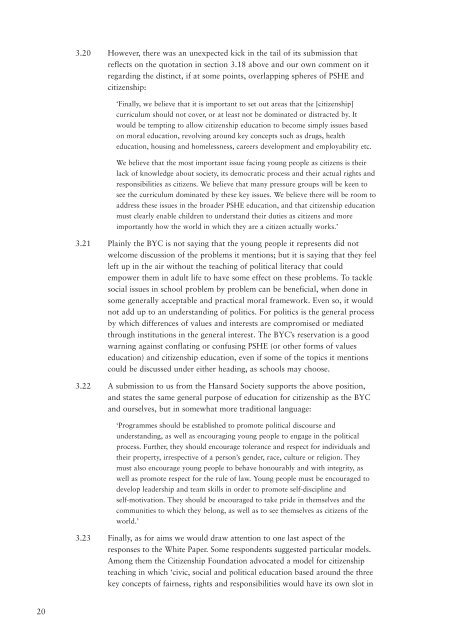Education for citizenship and the teaching of democracy in schools
Education for citizenship and the teaching of democracy in schools
Education for citizenship and the teaching of democracy in schools
Create successful ePaper yourself
Turn your PDF publications into a flip-book with our unique Google optimized e-Paper software.
3.20 However, <strong>the</strong>re was an unexpected kick <strong>in</strong> <strong>the</strong> tail <strong>of</strong> its submission that<br />
reflects on <strong>the</strong> quotation <strong>in</strong> section 3.18 above <strong>and</strong> our own comment on it<br />
regard<strong>in</strong>g <strong>the</strong> dist<strong>in</strong>ct, if at some po<strong>in</strong>ts, overlapp<strong>in</strong>g spheres <strong>of</strong> PSHE <strong>and</strong><br />
<strong>citizenship</strong>:<br />
‘F<strong>in</strong>ally, we believe that it is important to set out areas that <strong>the</strong> [<strong>citizenship</strong>]<br />
curriculum should not cover, or at least not be dom<strong>in</strong>ated or distracted by. It<br />
would be tempt<strong>in</strong>g to allow <strong>citizenship</strong> education to become simply issues based<br />
on moral education, revolv<strong>in</strong>g around key concepts such as drugs, health<br />
education, hous<strong>in</strong>g <strong>and</strong> homelessness, careers development <strong>and</strong> employability etc.<br />
We believe that <strong>the</strong> most important issue fac<strong>in</strong>g young people as citizens is <strong>the</strong>ir<br />
lack <strong>of</strong> knowledge about society, its democratic process <strong>and</strong> <strong>the</strong>ir actual rights <strong>and</strong><br />
responsibilities as citizens. We believe that many pressure groups will be keen to<br />
see <strong>the</strong> curriculum dom<strong>in</strong>ated by <strong>the</strong>se key issues. We believe <strong>the</strong>re will be room to<br />
address <strong>the</strong>se issues <strong>in</strong> <strong>the</strong> broader PSHE education, <strong>and</strong> that <strong>citizenship</strong> education<br />
must clearly enable children to underst<strong>and</strong> <strong>the</strong>ir duties as citizens <strong>and</strong> more<br />
importantly how <strong>the</strong> world <strong>in</strong> which <strong>the</strong>y are a citizen actually works.’<br />
3.21 Pla<strong>in</strong>ly <strong>the</strong> BYC is not say<strong>in</strong>g that <strong>the</strong> young people it represents did not<br />
welcome discussion <strong>of</strong> <strong>the</strong> problems it mentions; but it is say<strong>in</strong>g that <strong>the</strong>y feel<br />
left up <strong>in</strong> <strong>the</strong> air without <strong>the</strong> <strong>teach<strong>in</strong>g</strong> <strong>of</strong> political literacy that could<br />
empower <strong>the</strong>m <strong>in</strong> adult life to have some effect on <strong>the</strong>se problems. To tackle<br />
social issues <strong>in</strong> school problem by problem can be beneficial, when done <strong>in</strong><br />
some generally acceptable <strong>and</strong> practical moral framework. Even so, it would<br />
not add up to an underst<strong>and</strong><strong>in</strong>g <strong>of</strong> politics. For politics is <strong>the</strong> general process<br />
by which differences <strong>of</strong> values <strong>and</strong> <strong>in</strong>terests are compromised or mediated<br />
through <strong>in</strong>stitutions <strong>in</strong> <strong>the</strong> general <strong>in</strong>terest. The BYC’s reservation is a good<br />
warn<strong>in</strong>g aga<strong>in</strong>st conflat<strong>in</strong>g or confus<strong>in</strong>g PSHE (or o<strong>the</strong>r <strong>for</strong>ms <strong>of</strong> values<br />
education) <strong>and</strong> <strong>citizenship</strong> education, even if some <strong>of</strong> <strong>the</strong> topics it mentions<br />
could be discussed under ei<strong>the</strong>r head<strong>in</strong>g, as <strong>schools</strong> may choose.<br />
3.22 A submission to us from <strong>the</strong> Hansard Society supports <strong>the</strong> above position,<br />
<strong>and</strong> states <strong>the</strong> same general purpose <strong>of</strong> education <strong>for</strong> <strong>citizenship</strong> as <strong>the</strong> BYC<br />
<strong>and</strong> ourselves, but <strong>in</strong> somewhat more traditional language:<br />
‘Programmes should be established to promote political discourse <strong>and</strong><br />
underst<strong>and</strong><strong>in</strong>g, as well as encourag<strong>in</strong>g young people to engage <strong>in</strong> <strong>the</strong> political<br />
process. Fur<strong>the</strong>r, <strong>the</strong>y should encourage tolerance <strong>and</strong> respect <strong>for</strong> <strong>in</strong>dividuals <strong>and</strong><br />
<strong>the</strong>ir property, irrespective <strong>of</strong> a person’s gender, race, culture or religion. They<br />
must also encourage young people to behave honourably <strong>and</strong> with <strong>in</strong>tegrity, as<br />
well as promote respect <strong>for</strong> <strong>the</strong> rule <strong>of</strong> law. Young people must be encouraged to<br />
develop leadership <strong>and</strong> team skills <strong>in</strong> order to promote self-discipl<strong>in</strong>e <strong>and</strong><br />
self-motivation. They should be encouraged to take pride <strong>in</strong> <strong>the</strong>mselves <strong>and</strong> <strong>the</strong><br />
communities to which <strong>the</strong>y belong, as well as to see <strong>the</strong>mselves as citizens <strong>of</strong> <strong>the</strong><br />
world.’<br />
3.23 F<strong>in</strong>ally, as <strong>for</strong> aims we would draw attention to one last aspect <strong>of</strong> <strong>the</strong><br />
responses to <strong>the</strong> White Paper. Some respondents suggested particular models.<br />
Among <strong>the</strong>m <strong>the</strong> Citizenship Foundation advocated a model <strong>for</strong> <strong>citizenship</strong><br />
<strong>teach<strong>in</strong>g</strong> <strong>in</strong> which ‘civic, social <strong>and</strong> political education based around <strong>the</strong> three<br />
key concepts <strong>of</strong> fairness, rights <strong>and</strong> responsibilities would have its own slot <strong>in</strong><br />
20


